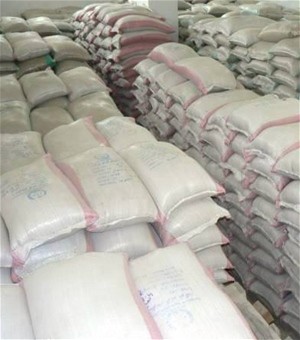
The Nangarhar Seed Producer and Wholesaler Association’s new seed storage facility in Jalalabad.
USAID/ASMED
New seed storage facility in Nangarhar offers a secure, clean place to preserve seeds.
13 OCTOBER 2009 | JALALABAD, AFGHANISTAN
Increasing the capacity to store seeds for future planting seasons is key to the sustainability and growth of the agriculture sector in Afghanistan. USAID recently assisted the Nangarhar Seed Producer and Wholesaler Association (SPWA) in the construction of a new seed storage facility in eastern Afghanistan. Previously, the association lacked an adequate storage facility where seeds could be preserved in safe, sanitary conditions and then sold according to seasonal demand. Seed quality now meets the requirements of the Ministry of Agriculture, United Nations Food Program, and private sector clients.
SPWA is an umbrella organization of 130 farmers that aims to achieve self-sufficiency in seed production for Afghanistan. SPWA’s new facility has the capacity to store 300 metric tons of seed at a time, and farmers from three districts of Nangarhar will benefit directly. A clean, temperature-controlled facility will limit waste, maximize profit, and encourage farmers to increase output. This increased efficiency will benefit the entire value chain for wheat and other stockpiled staple crops in Afghanistan.
Haji Ghulam Nabi, the association’s director, considers the project to be essential for the development of Afghanistan’s agriculture sector. “The facility has solved our farmers’ main problem as we can now store seed safely and cleanly,” he said. “Before, we kept seed at our homes, where it was susceptible to mice, disease, and moisture. Because of these conditions, the Ministry of Agriculture and other organizations were reluctant to buy our seed as it would not have met their health and safety standards. With this new facility, our association generated over $1,000 this year in seed storage fees.”
In summer 2009, the Nangarhar Seed Association produced approximately 1,200 tons of wheat seed, 300 of which were stored in the facility. The association was then able to sell the seed to the Ministry of Agriculture, the Food and Agriculture Association of the United Nations, and several Provincial Reconstruction Teams. Assistance to business associations in the procurement of productive equipment, like this warehouse, is an effective way of achieving improved membership services for businesses, financial sustainability for the association, and long-lasting positive impact on the region’s agriculture sector.







Comment
Make a general inquiry or suggest an improvement.